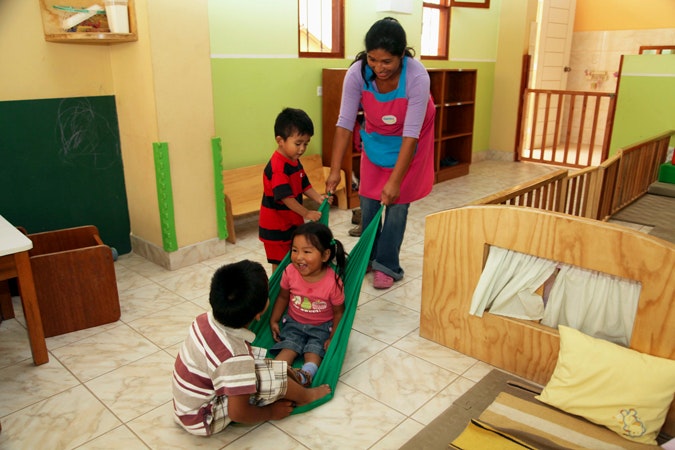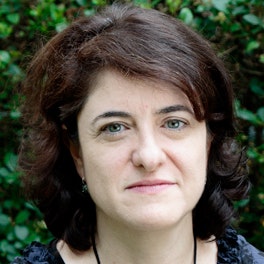In Peru, the Fight Against Poverty Starts Early
By Sarah Klaus

Early childhood is the most critical phase of human development. It begins before birth while the child is forming in the mother’s womb, continues through early infancy when key relationships are established and developmental milestones reached, and includes the preschool years as well as the transition into the early grades. These are all crucial moments in a young child’s life.
Physically, emotionally, developmentally—the direction a child’s life will take owes a huge amount to their first 1,000 days and the care, nutrition, love, and interactions the child receives. If the adult caregivers live in dire poverty, inhabit inadequate housing, do not have regular access to nutritious food, have limited access to health services and information about child development, are too ill or busy to play and interact with their children, the children will, inevitably, suffer short and long term consequences.
How can society support children born into extreme poverty to ensure that they can reach their full potential? Quality early childhood programs have been shown to reduce inequality, counteracting the effects of discrimination and poverty. In Peru, the Cuna Mas program is attempting to do just that.
Child development, often neglected, underfunded, or misunderstood in countries where other priorities have noisier advocates, is benefiting from this innovative program, launched by the government and now supported by civil society. Developed by Peru’s Ministry of Development and Social Inclusion, Cuna Mas is an early childhood development program for children under 36 months living in poverty that provides day care and home visiting services for 62,042 children.
Today, there are over 1.6 million children under the age of three in Peru and it is estimated that nearly 600,000 of them live in poverty.
The program aims to move children who are being cared for in neighbors’ homes to upgraded community centers or new infant and toddler centers with enhanced learning environments. These centers are better designed and resourced, organized by children’s developmental characteristics and staffed with personnel who have a more rounded knowledge of a child’s needs.
Andrea Portugal, executive director of Cuna Mas, explains:
Cuna Mas aims to improve early childhood development in children under three years old from poor and extremely poor areas, in order to overcome their gaps in cognitive, social, emotional, and physical development. We expect that every child in our program will reach his or her full potential, through a comprehensive service that provides quality education, food and nutrition, health, and learning environments. By working in partnership with families and the community, Cuna Mas strengthens their capacity to manage and supervise the quality of the program services and to promote their children’s growth and development.
In many ways the program is a model of how daycare can and should be offered throughout the world. “There are eight principles that run through our work,” says Portugal: “a program that promotes healthy, happy and competent children; care as a source of affection and learning; an environment that promotes well being; a close relationship with families, main educators of children; an adult who listens and responds respecting the individuality of each child; an adult who observes, registers and plans; a community that participates to build a democratic culture and a program that values and incorporates diversity, and promotes the inclusion of all.”
Central, regional, and local governments, as well as local communities—and in some cases businesses and NGOs working in the communities—act as partners to provide community centers or land for building new infant and toddler centers, as well as other resources. Cuna Mas is a distinctly Peruvian program, incorporating the best practices in early childhood care and education from international programs as well as the diversity that exists in Peru.
Cuna Mas is based on strong social justice principles that the child, the family, and the community must be seen as competent and be treated with respect, instead of seeing people living in conditions of poverty as “depressed, deprived, disorderly, and dysfunctional.” The program sees very young children as the protagonists of their own learning and the role of the adults to respond and support their initiative. Families are supported as the first and most important educators in their children’s lives, and the role of the community is seen as essential in building democratic practices.
“We strongly believe that democratic values such as dialogue, respect, tolerance, solidarity, listening, citizenship, care for others and the environment, are cultivated from the very early years of life, in a child’s relation with others and their environment,” says Portugal. “We seek not only to improve every child’s potential, but also to better educate citizens and create a democratic culture in each community we work with.”
The Open Society Early Childhood Program is working with Peru’s Ministry of Social Inclusion and local experts to develop, pilot, and deliver comprehensive training for Cuna Mas staff, who will in turn train hundreds of pedagogical coordinators, health and nutrition specialists and thousands of caregivers who provide direct services to families and children.
To find out more about Cuna Mas and see the program in action, you can view a short film (in Spanish) here

Until December 2021, Sarah Klaus was a senior program advisor at the Open Society Foundations.